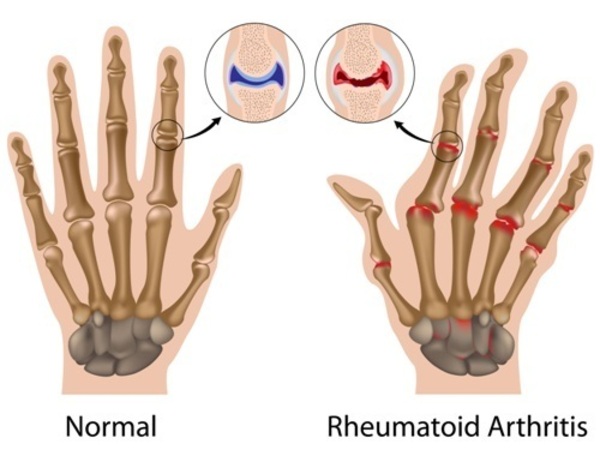
Rheumatoid Arthritis Diet
There are books that claim they have the miracle rheumatoid arthritis diet on the shelves, but

Rheumatoid arthritis is a disease that affects the joints. It causes pain, swelling, and stiffness. If one knee or hand has rheumatoid arthritis, usually the other does too. This disease often occurs in more than one joint and can affect any joint in the body. People with this disease may feel sick and tired, and they sometimes get fevers.
Some people have mild or moderate forms of the disease with times when the symptoms get worse and times when they get better. Others have a severe form of the disease that can last for many years or a lifetime. This form of the disease can cause serious joint damage.
Anyone can get this disease, though it occurs more often in women. Rheumatoid arthritis often starts in middle age and is most common in older people. But children and young adults can also get it.
Doctors don’t know the exact cause of rheumatoid arthritis. They know that with this arthritis, a person’s immune system attacks his or her own body tissues. Researchers are learning many things about why and how this happens. Things that may cause rheumatoid arthritis are:
People can go to a family doctor or rheumatologist to be diagnosed. A rheumatologist is a doctor who helps people with problems in the joints, bones, and muscles. Rheumatoid arthritis can be hard to diagnose because:
To diagnose rheumatoid arthritis, doctors use medical history, physical exam, x rays, and lab tests.
Doctors have many ways to treat this disease. The goals of treatment are to:
Treatment can include patient education, self-management programs, and support groups that help people learn about:
These programs help people:
Treatment for rheumatoid arthritis may involve:
Here are some ways to take care of yourself:
Most people with rheumatoid arthritis take medicine. Drugs can be used for pain relief, to reduce swelling, and to stop the disease from getting worse. What a doctor prescribes depends on:
There are many kinds of surgery for people with severe joint damage. Surgery is used to:
Surgery is not for everyone. Talk about the option with your doctor.
Regular medical care is important so doctors can:
Your care may include blood, urine, and other lab tests and x rays.
Special diets, vitamins, and other alternative therapies are sometimes suggested to treat rheumatoid arthritis. Some therapies help people reduce stress. Many of these treatments are not harmful, but they may not be well tested or have any real benefits.
People should talk with their doctor before starting an alternative therapy. If the doctor feels the therapy might help and isn’t harmful, it can become part of regular care.
Research is being done in many areas:

There are books that claim they have the miracle rheumatoid arthritis diet on the shelves, but
Medical Referral | Accident Attorney Referrals
Filter out the noise and nurture your inbox with health and wellness advice that’s inclusive and rooted in medical expertise.
MedicalReferral.com does not provide medical advice, diagnosis, or treatment.